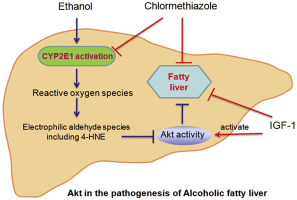Redox Biology ( IF 10.7 ) Pub Date : 2017-09-27 , DOI: 10.1016/j.redox.2017.09.018 Tao Zeng , Cui-Li Zhang , Ning Zhao , Min-Jie Guan , Mo Xiao , Rui Yang , Xiu-Lan Zhao , Li-Hua Yu , Zhen-Ping Zhu , Ke-Qin Xie

|
Protein kinase B (PKB/Akt) plays important roles in the regulation of lipid homeostasis, and impairment of Akt activity has been demonstrated to be involved in the development of non-alcoholic fatty liver disease (NAFLD). Previous studies suggest that cytochrome P4502E1 (CYP2E1) plays causal roles in the pathogenesis of alcoholic fatty liver (AFL). We hypothesized that Akt activity might be impaired due to CYP2E1-induced oxidative stress in chronic ethanol-induced hepatic steatosis. In this study, we found that chronic ethanol-induced hepatic steatosis was accompanied with reduced phosphorylation of Akt at Thr308 in mice liver. Chronic ethanol exposure had no effects on the protein levels of phosphatidylinositol 3 kinase (PI3K) and phosphatase and tensin homologue deleted on chromosome ten (PTEN), and led to a slight decrease of phosphoinositide-dependent protein kinase 1 (PDK-1) protein level. Ethanol exposure resulted in increased levels of malondialdehyde (MDA) and 4-hydroxynonenal (4-HNE)-Akt adducts, which was significantly inhibited by chlormethiazole (CMZ), an efficient CYP2E1 inhibitor. Interestingly, N-acetyl-L-cysteine (NAC) significantly attenuated chronic ethanol-induced hepatic fat accumulation and the decline of Akt phosphorylation at Thr308. In the in vitro studies, Akt phosphorylation was suppressed in CYP2E1-expressing HepG2 (CYP2E1-HepG2) cells compared with the negative control HepG2 (NC-HepG2) cells, and 4-HNE treatment led to significant decrease of Akt phosphorylation at Thr308 in wild type HepG2 cells. Lastly, pharmacological activation of Akt by insulin-like growth factor-1 (IGF-1) significantly alleviated chronic ethanol-induced fatty liver in mice. Collectively, these results indicate that CYP2E1-induced oxidative stress may be responsible for ethanol-induced suppression of Akt phosphorylation and pharmacological modulation of Akt in liver may be an effective strategy for the treatment of ethanol-induced fatty liver.
中文翻译:

CYP2E1介导的氧化应激对Akt活性的损害与慢性乙醇诱导的脂肪肝有关
蛋白激酶B(PKB / Akt)在脂质稳态的调节中起着重要作用,并且Akt活性受损已被证明与非酒精性脂肪肝疾病(NAFLD)的发展有关。先前的研究表明,细胞色素P4502E1(CYP2E1)在酒精性脂肪肝(AFL)的发病机理中起因果作用。我们假设在慢性乙醇诱发的肝脂肪变性中,CYP2E1诱导的氧化应激可能会削弱Akt的活性。在这项研究中,我们发现,慢性乙醇诱发的肝脂肪变性伴有小鼠肝脏Thr308处Akt磷酸化的降低。长期暴露于乙醇对十号染色体(PTEN)上缺失的磷脂酰肌醇3激酶(PI3K)和磷酸酶和张力蛋白同源物的蛋白质水平没有影响,并导致磷酸肌醇依赖性蛋白激酶1(PDK-1)蛋白水平略有下降。乙醇暴露导致丙二醛(MDA)和4-羟基壬烯醛(4-HNE)-Akt加合物的水平增加,这被有效的CYP2E1抑制剂氯甲唑(CMZ)显着抑制。有趣的是,N-乙酰基大号-半胱氨酸(NAC)显着减轻了慢性乙醇诱导的肝脏脂肪积累和Thr308处Akt磷酸化的下降。在体外研究中,与阴性对照HepG2(NC-HepG2)细胞相比,在表达CYP2E1的HepG2(CYP2E1-HepG2)细胞中抑制了Akt磷酸化,并且4-HNE处理导致野生的Thr308上的Akt磷酸化显着降低HepG2型细胞。最后,胰岛素样生长因子-1(IGF-1)对Akt的药理激活显着减轻了小鼠慢性乙醇诱导的脂肪肝。总体而言,这些结果表明,CYP2E1诱导的氧化应激可能是乙醇诱导的Akt磷酸化抑制,肝脏中Akt的药理调节可能是治疗乙醇诱导的脂肪肝的有效策略。

































 京公网安备 11010802027423号
京公网安备 11010802027423号